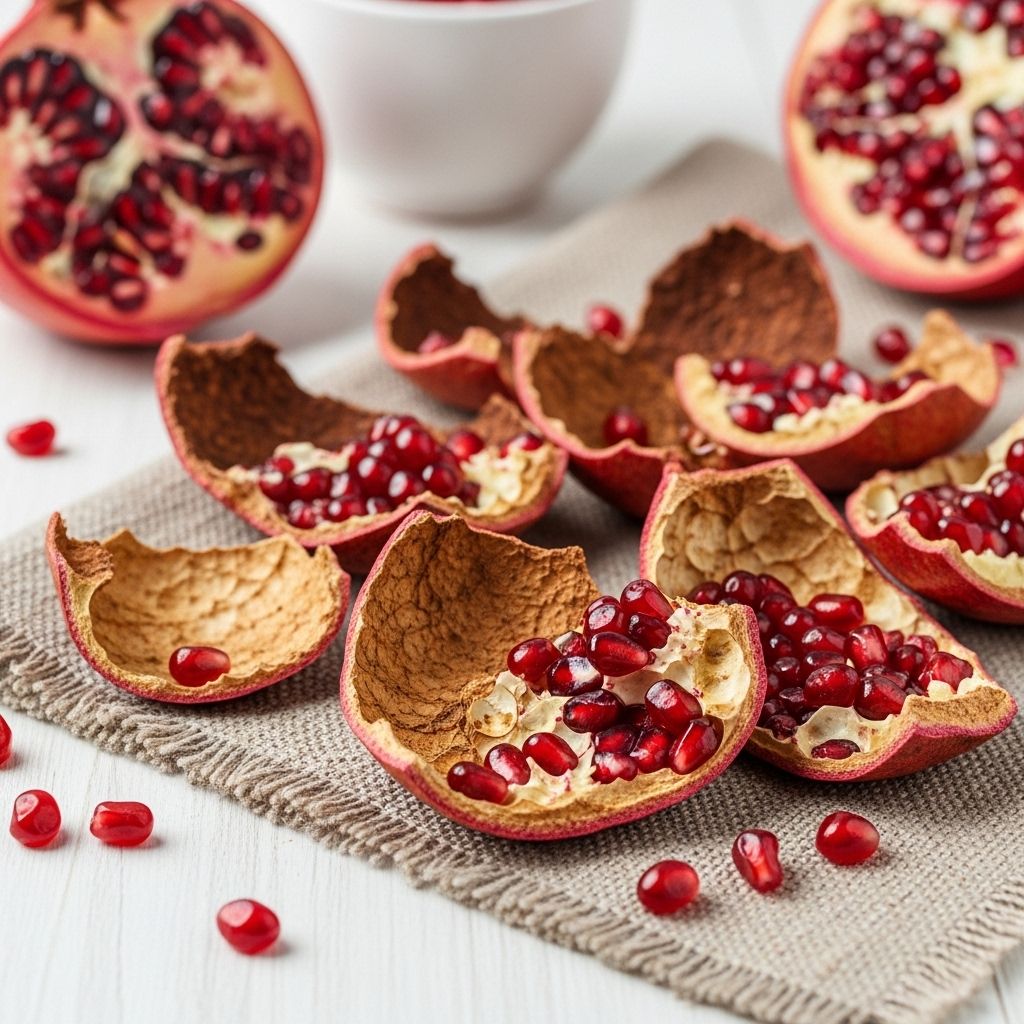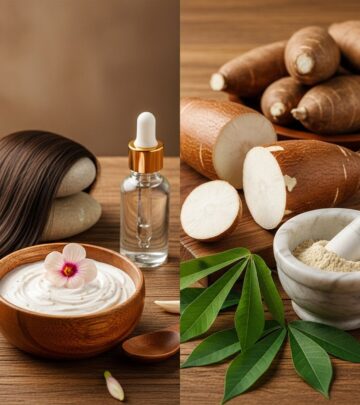Unlocking the Benefits of Pomegranate Peel for Skin, Hair, and Health
Discover the science-backed advantages of pomegranate peel for radiant skin, strong hair, and overall wellness.

Pomegranate is widely celebrated for its jewel-like seeds and sweet-tart juice, but the often discarded pomegranate peel is emerging as a powerhouse ingredient in natural wellness and beauty routines. The peel comprises nearly half the fruit’s mass and is densely packed with bioactive compounds, especially antioxidants, polyphenols, and fatty acids, granting it wide benefits for skin, hair, and overall health.
From Ayurvedic traditions to modern clinical research, pomegranate peel is being recognized for its potential to detoxify, renew, and protect the body inside and out. This article provides a comprehensive guide to its scientifically-supported benefits, practical uses, safety tips, and answers to common questions.
Table of Contents
- Introduction
- Pomegranate Peel Benefits for Skin
- Pomegranate Peel Benefits for Hair
- Pomegranate Peel Benefits for Health
- How to Use Pomegranate Peel
- Precautions and Side Effects
- Frequently Asked Questions (FAQs)
Introduction
Pomegranate (Punica granatum L.) peel is commonly overlooked and discarded, but its use dates back centuries in Ayurveda and folk medicine. Researchers now show that pomegranate peel contains higher concentrations of antioxidants—including polyphenols, ellagic acid, tannins—than the edible arils, making it especially valuable for health and beauty regimens. From treating skin hyperpigmentation to fortifying hair and improving digestive health, pomegranate peel’s versatility is as impressive as its nutrient profile.
The peel can be dried, powdered, and used in a variety of forms: masks, teas, supplements, infusions, or topicals. Modern research is beginning to validate the array of traditional benefits once attributed to this humble fruit’s skin.
Pomegranate Peel Benefits for Skin
Pomegranate peel’s most celebrated properties revolve around its ability to promote radiant, clear, and youthful skin. Here’s how:
- Natural Exfoliant: Powdered pomegranate peel gently removes dead skin cells, revealing a fresher complexion beneath. Regular exfoliation helps reduce dullness and promotes a healthy glow.
- Moisturizing Properties: Fatty acids in the peel help nourish and hydrate, supporting the natural moisture barrier and defending against dryness and flakiness.
- Hyperpigmentation Reduction: Studies have found that masks and serums containing pomegranate peel lighten areas of hyperpigmentation over time with no adverse effects.
- Brightening Complexion: The peel minimizes pigmentation, fights dark spots, and supports a brighter skin tone when used regularly.
- Protection against Sun Damage: Pomegranate peel is rich in tannins and ellagic acid, which may help protect against harmful ultraviolet (UVB) rays, lessening sun-induced aging and damage.
- Anti-Acne Effects: Both antibacterial and anti-inflammatory effects are attributed to pomegranate peel, helping curb breakouts and soothe redness.
- Anti-Aging Benefits: Antioxidants combat oxidative stress, which contributes to premature aging, wrinkles, and loss of elasticity. The ellagic acid and polyphenols found in the peel help prevent the appearance of fine lines, sagging, and dark spots.
- Wound Healing: Topical ointments derived from pomegranate peel have promoted wound healing in animal studies, though more clinical trials are needed for human use.
Pomegranate Peel Skin Benefits Summary Table
| Benefit | Action | Main Compounds |
|---|---|---|
| Exfoliation | Removes dead skin cells for a brighter look | Polyphenols, Bioactive Compounds |
| Moisturizing | Hydrates and nourishes skin | Fatty acids |
| Hyperpigmentation Reduction | Lightens dark spots | Antioxidants, Polyphenols |
| Sun Damage Protection | Shields skin from UVB rays | Ellagic acid, Tannins |
| Anti-Acne | Reduces breakouts, soothes inflammation | Antibacterials, Polyphenols |
| Anti-Aging | Improves skin elasticity, reduces wrinkles | Ellagic acid, Antioxidants |
Pomegranate Peel Benefits for Hair
Pomegranate peel, along with seed oil, is gaining popularity in haircare routines for its protective and nourishing effects on the scalp and strands:
- Scalp Fortification: Punicic acid—an anti-inflammatory molecule in the peel—soothes scalp irritation and offers anti-fungal benefits that can help prevent dandruff.
- Increased Hair Strength: The antioxidants defend against oxidative stress on the scalp and stimulate blood flow, promoting stronger, healthier hair growth.
- Enhanced Radiance & Shine: Fatty acids help coat hair strands with a protective layer, fending off environmental damage and locking in shine and smoothness.
- Supports Hair Growth: By encouraging scalp health, hydration, and circulation, pomegranate peel creates an optimal environment for hair growth (though direct human studies are limited).
Pomegranate Peel Hair Benefits Table
| Benefit | Hair Impact | Key Compound |
|---|---|---|
| Scalp Health | Soothes irritation, prevents dandruff | Punicic acid, Antioxidants |
| Strength | Improves hair resilience, reduces breakage | Antioxidants |
| Shine & Luster | Boosts smoothness and radiance | Fatty acids |
| Growth Environment | Encourages healthy conditions for hair growth | Antioxidants, Polyphenols |
Pomegranate Peel Benefits for Health
Beyond beauty, pomegranate peel provides numerous advantages for overall wellness:
- Immunity Booster: Rich in vitamins C, E, and antioxidants, the peel supports immune function and helps the body fend off infections.
- Promotes Detoxification: Its antioxidants and bioactive compounds facilitate removal of toxins and heavy metals, contributing to clearer skin and better metabolic health.
- Heart Health: The polyphenols in the peel help reduce cholesterol and support healthy blood flow, lowering cardiovascular risk.
- Digestive System Support: Dietary fiber and bioactives aid in relieving constipation, bloating, and indigestion, fostering gut health and regularity.
Pomegranate Peel Health Benefits Summary Table
| Benefit | Impact | Main Compounds |
|---|---|---|
| Immunity | Boosts defenses against illness | Vitamin C, Antioxidants |
| Detoxification | Facilitates toxin removal | BIOactive polyphenols |
| Heart Health | Lowers cholesterol, improves circulation | Ellagic acid, Polyphenols |
| Digestive Health | Promotes regularity, gut comfort | Dietary fiber |
How to Use Pomegranate Peel
Pomegranate peel can be incorporated into your daily routine in several ways:
- Powdered Mask: Dry the peel, crush into powder, and mix with water or yogurt to create a skin-brightening mask.
- Tea or Infusion: Simmer dried peel in water for a detoxifying herbal tea.
- Topical Paste: Combine powdered peel with honey to soothe acne and irritated skin.
- Hair Rinse: Boil peels, strain, and use the infusion as a scalp rinse for shine and strength.
- Supplement Form: Available as capsules or powders for daily wellness.
Sample Pomegranate Peel Face Mask Recipe
- Mix 1 tablespoon of dried pomegranate peel powder
- Add 2 tablespoons of yogurt (or rose water for sensitive skin)
- Blend into a paste, apply for 15-20 minutes
- Rinse thoroughly with warm water and pat dry
Precautions and Side Effects
- Always perform a patch test before using homemade peels, as some people may experience mild skin sensitivity.
- Select organic, pesticide-free fruit where possible since peels can retain residues.
- Do not eat fresh raw peels—they can be bitter and hard to digest. Use dried, powdered forms instead.
- If you have allergies or chronic skin conditions, consult a dermatologist before use.
Frequently Asked Questions (FAQs)
Q: Can pomegranate peel be used on all skin types?
A: Yes, but those with extremely sensitive or allergy-prone skin should patch test before full application.
Q: How often should I apply pomegranate peel masks?
A: 1–2 times per week is generally recommended for exfoliation or brightening. Excessive use may lead to dryness.
Q: Can pomegranate peel help fade acne scars?
A: The antioxidants and polyphenols may help lighten pigment and support skin renewal, assisting in fading scars over time.
Q: Is it safe to consume pomegranate peel?
A: Only dried, ground peel in small quantities (as tea or supplement) is safe. Do not eat the raw peel directly.
Q: Does pomegranate peel oil promote hair growth?
A: While direct human research is limited, it does create a healthier scalp environment conducive to hair growth.
Q: Are there any side effects?
A: Some people may experience minor irritation. Always patch test and consult a healthcare provider for persistent reactions.
Conclusion
Pomegranate peel offers a trove of antioxidants, polyphenols, and nutrients that promote vibrant skin, strong hair, and improved well-being. When used appropriately—whether on the skin, in the hair, or as a supplement—it is a versatile and powerful addition to your natural wellness toolkit.
Read full bio of medha deb











